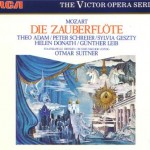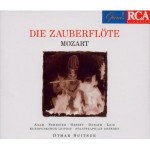Die Zauberflöte
1970, RCA Victor
(Peter Schreier, Helen Donath, Gunther Leib, Sylvia Geszty, Theo Adam, Harald Neukirch; Rundfunkchor Leipzig; Staatskapelle Dresden, cond. Otmar Suitner)
This Flute is an obscure one (I had already loved the opera for years before I even knew it existed), but definitely worth hearing and worth owning. While not an outstanding or even especially distinctive performance, it still provides plenty for a Mozart devotee to enjoy. Otmar Suitner leads the Staatskapelle Dresden in a first-rate reading of the score, neither emphasizing heavy grandeur nor zippy lightness, but with a good blend of the two qualities.
As far as the singers are concerned, the recording’s chief highlights are its hero and heroine. Peter Schreier, in the first of three studio outings as Tamino, lacks the honeyed timbre of other tenors, but he compensates beautifully with his vocal warmth, lyricism and ardor. Helen Donath’s Pamina shines even more brightly. I understand why some critics label her light, crystalline timbre “too girlish,” but still, she sings with enchanting sweetness, purity and feeling. The rest of the cast is less distinguished, but decent all around. Gunther Leib is an adequate, unremarkable Papageno, with a smallish, fairly reedy yet pleasant lyric baritone and an understated yet likeable characterization. Sylvia Geszty is a solid Queen of the Night with a piercing timbre, well-executed if not thrilling coloratura, and fiery, imperious temperament to spare (maybe too much in her brief spoken dialogue – does she really need to be so shrill?). Theo Adam brings a warm, silky timbre to Sarastro, but his tone is more baritone than bass and never sounds fully steady. The Three Boys (one of whom, Olaf Bär, grew up to record Papageno under Sir Neville Marriner’s baton) are excellent, while Harald Neukirch’s Monostatos, Siegfried Vogel’s Speaker and the Three Ladies are all fine, if nothing special. Oddly, the music of the “Two Armored Men” is sung not by two men, but by a male ensemble in hushed tones – an interesting experiment, but not worth repeating. The spoken dialogue is well performed, with the standard cuts.
All in all, this Flute is hardly my favorite, but if you find a copy, either as your first Flute or as your twentieth, then by all means give it a listen. It may not be a perfect recording, but nonetheless it’s a good one.





